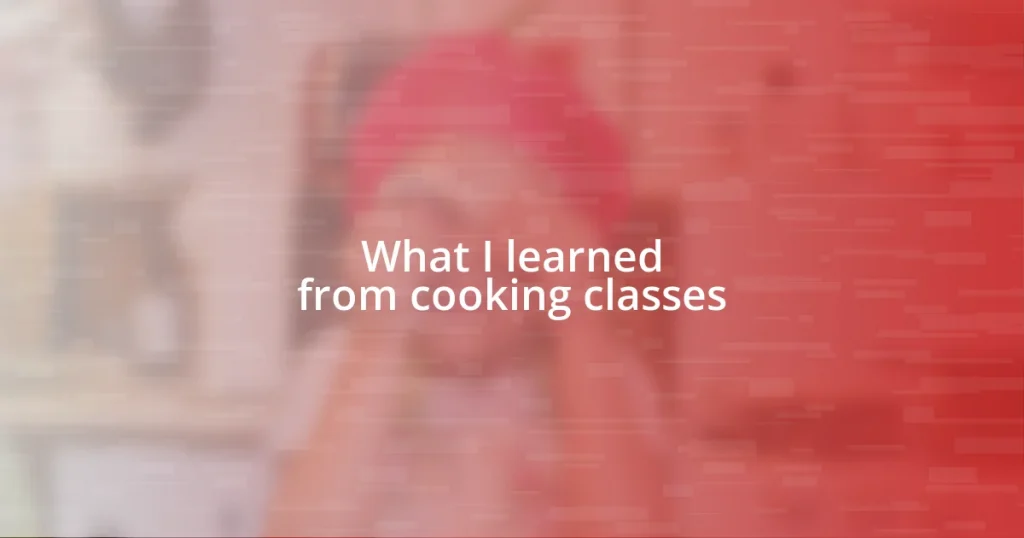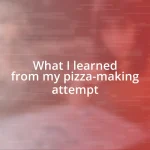Key takeaways:
- Gained confidence in cooking by embracing mistakes and learning through experience, which transformed the approach to culinary challenges.
- Acquired essential skills such as proper seasoning, mastering cooking techniques, and time management, enhancing both the cooking process and meal presentation.
- Explored international cuisines, fostering a deeper connection to diverse cultures and creating memorable experiences through shared meals and themed dinner gatherings.
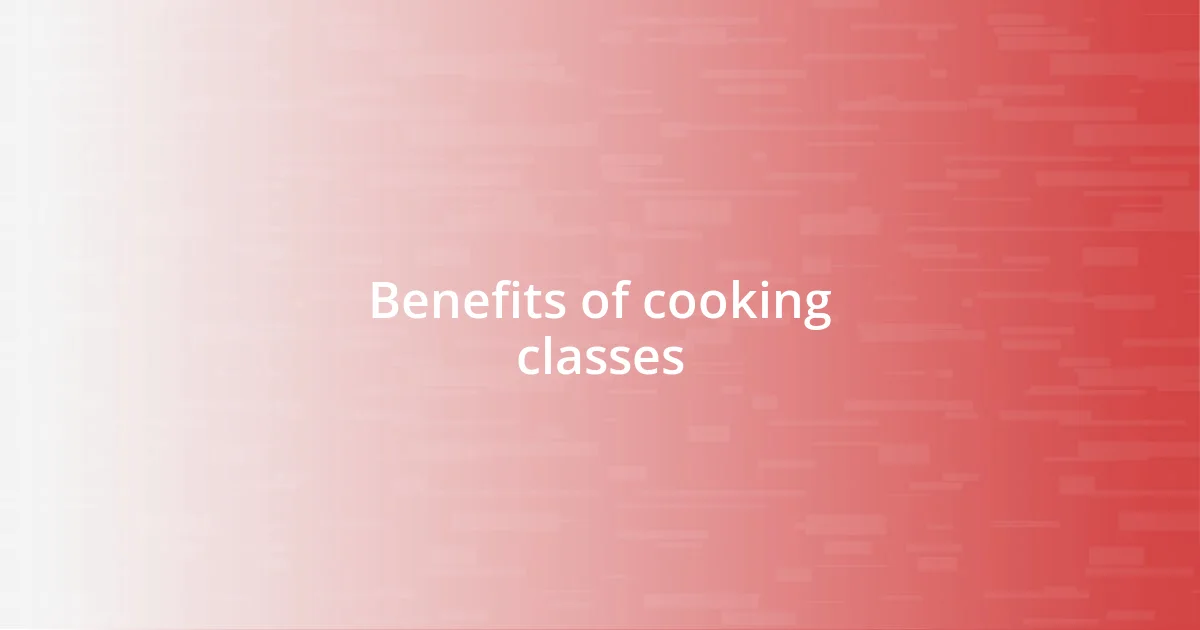
Benefits of cooking classes
Taking cooking classes opened up a world of flavors and techniques I never thought I’d explore. I remember the first time I mastered a simple knife cut—it felt almost like art. Isn’t it amazing how something as basic as chopping vegetables can boost your confidence in the kitchen?
What I found particularly rewarding was the sense of community that blossomed during these classes. Sharing a meal with fellow learners, exchanging stories, and laughing over our cooking mishaps made the experience unforgettable. Have you ever felt like you belonged in a place simply because you shared a common interest? That’s exactly how cooking classes made me feel.
The classes also taught me the importance of patience and creativity. When I attempted to recreate a dish and it didn’t turn out as planned, instead of frustration, I felt a spark of determination. Isn’t it empowering to realize that making mistakes is just part of the journey? This mindset has not only shaped my cooking style but also translated into how I approach challenges in life.
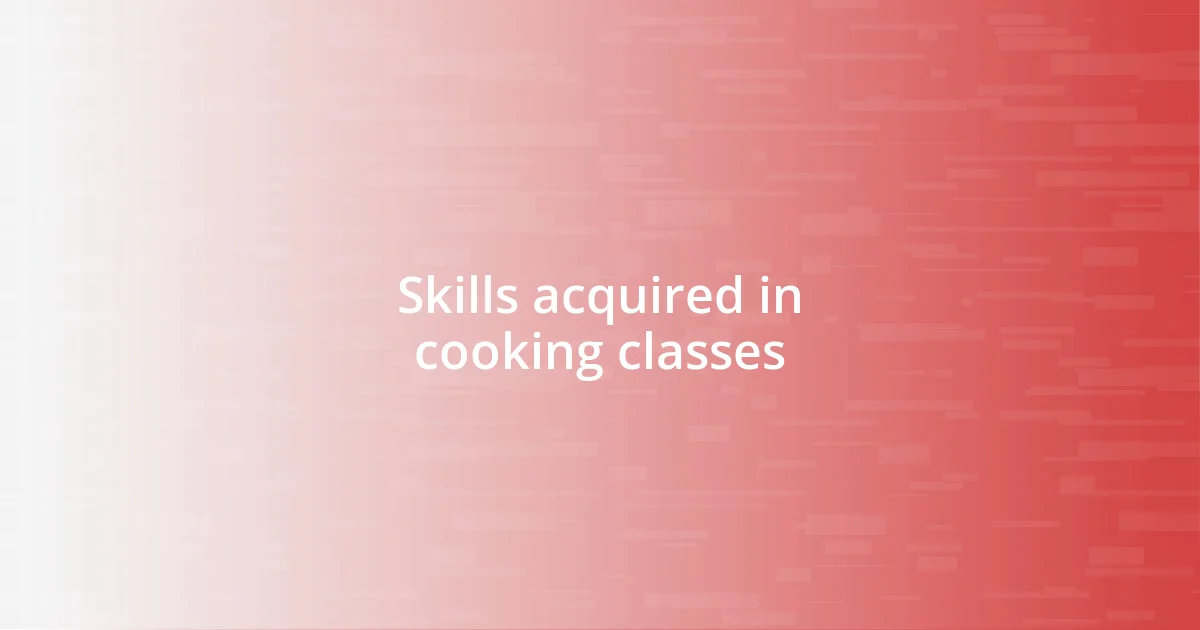
Skills acquired in cooking classes
Taking cooking classes truly expanded my culinary toolkit. One skill that surprised me was learning how to properly season food. It was eye-opening to discover that seasoning is an art—a sprinkle of salt or a dash of herbs can dramatically elevate a dish. The instructor once said, “Taste as you go,” and that simple advice transformed how I approach every meal. Have you ever overlooked the power of seasoning?
Another significant skill I gained was mastering kitchen techniques, like sautéing and braising. I remember the first time I seared a steak; the smell was incredible, and watching it caramelize was mesmerizing. These techniques are not just about cooking but understanding the science behind transforming raw ingredients into something beautiful. It’s like alchemy!
Lastly, I honed my time management skills in the kitchen. Juggling multiple recipes and ensuring everything is cooked perfectly at the right time felt like a choreographed dance. I can’t tell you how satisfying it was to present a perfectly timed meal to friends. Have these challenges ever occurred to you while cooking? It’s all about staying focused and organized, which I’ve found crucial not just in cooking but in life as well.
| Skill | Description |
|---|---|
| Seasoning | Learning to enhance flavors through proper seasoning techniques. |
| Kitchen Techniques | Mastering essential cooking techniques that elevate your food. |
| Time Management | Developing the ability to multitask and present meals efficiently. |
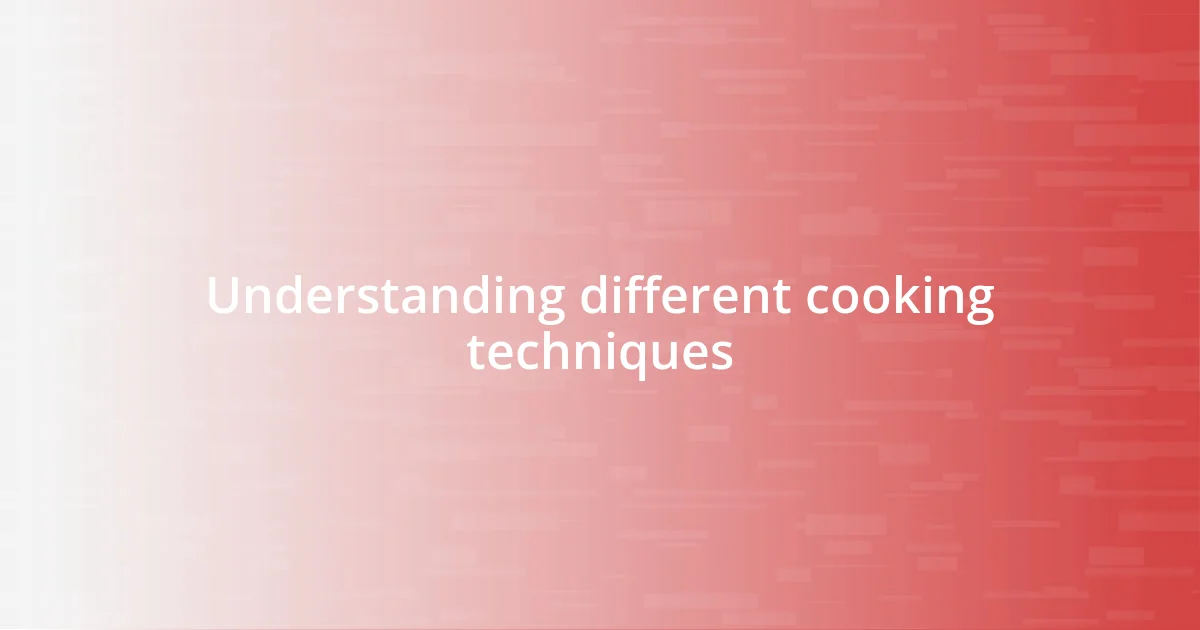
Understanding different cooking techniques
Understanding different cooking techniques has been a game changer for me. Each method I learned revealed a new layer of culinary possibility. For instance, when I first tackled the art of poaching eggs, it felt like a rite of passage. Watching those delicate whites encase the golden yolk, I realized this technique wasn’t just about cooking; it was about precision and patience. It taught me that even the simplest dishes can be elevated when approached with care. How often do we overlook the beauty in such brainless endeavors?
- Sautéing: This technique uses a small amount of oil and high heat, perfect for quickly cooking vegetables while retaining their crunch.
- Braising: A method that marries searing and slow cooking, ideal for tenderizing tough cuts of meat.
- Grilling: Cooking food over an open flame, allowing for that delightful char and smoky flavor.
- Stir-frying: A fast and versatile approach where ingredients are cooked quickly at high heat in a wok.
- Baking: Involves precise measurements and controlled heat, transforming simple batter into delightful treats.
Every technique I learned felt like unlocking a door to a greater culinary world. For example, mastering the nuances of baking was particularly fulfilling. I recall the first time I baked bread; the aroma wafting through my kitchen was intoxicating! I was amazed at how simple ingredients could turn into something so wonderful through the magic of heat and time. This experience deepened my appreciation for the process, reminding me that cooking is as much about the journey as it is about the destination.

Importance of ingredient selection
Choosing the right ingredients is like selecting the perfect brush for a painting; it sets the tone for the entire dish. I remember the first time I tried to make a classic marinara sauce with subpar tomatoes. The difference in flavor was staggering; it felt like trying to sing a beautiful song with a broken microphone. This experience reinforced the importance of ingredient selection; fresh, high-quality produce can elevate even the simplest recipes.
I often ask myself, “What am I missing if I don’t prioritize my ingredients?” It turns out that the answer lies in the foundation they provide to a dish. For example, when I substituted dried herbs for fresh ones in a recipe, I wasn’t just cutting corners; I was diminishing the overall flavor profile. The vibrant aroma of fresh basil or the crispness of a freshly picked bell pepper creates layers and textures that dried versions simply can’t replicate. It’s a game-changer in the kitchen!
Having learned the nuances of ingredient selection, I now approach grocery shopping like an adventure. Whenever I visit a farmers’ market, I feel like a kid in a candy store—everything looks delicious and worthwhile to explore! I often find myself engaging with vendors, asking about their growing practices, and learning about seasonal produce. It’s gratifying to know that the fresh carrots I’m about to slice were harvested just hours before, rather than weeks. This connection not only enhances my cooking but also enriches my appreciation for food and its origins. How has your relationship with ingredients evolved?
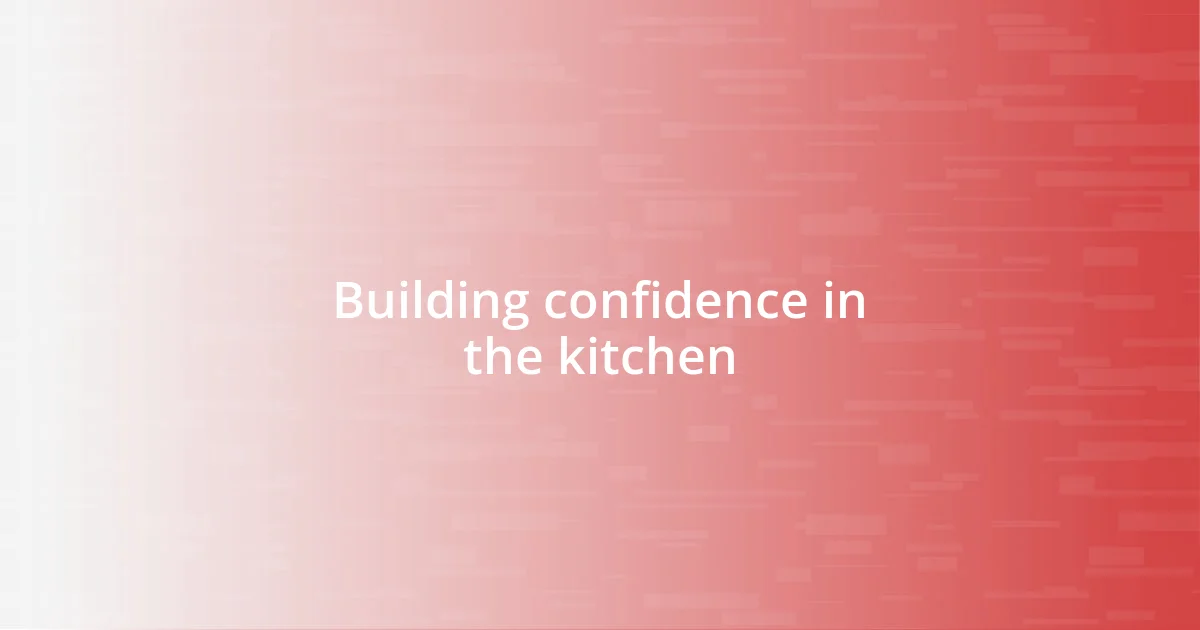
Building confidence in the kitchen
Building confidence in the kitchen often stems from understanding that making mistakes is part of the learning process. I still remember the first time I attempted to flip a pancake. I was nervous, holding my breath, and as it soared slightly off the pan, I burst into laughter. That moment taught me that cooking isn’t just about the final dish—it’s about enjoying the journey, embracing the mishaps, and knowing it’s okay to have a bit of fun along the way. Isn’t it freeing to realize that perfection isn’t the goal?
As I honed my skills, I found that confidence began to blossom with each successful recipe. The first time I confidently seared a steak, I felt a wave of satisfaction wash over me. The sizzling sound and the fragrant aroma were intoxicating, and I could see it on the faces of my friends as they savored every bite. It made me think: how often do we underestimate our abilities? Taking on various recipes—with each attempt feeling like a small victory—transformed my perspective about what I could create in the kitchen.
I’ve discovered that sharing my cooking experiences with others catalyzes my confidence even further. When I host friends for a dinner party, I get excited about trying new dishes, pairing ingredients I’ve never matched before. There’s something exhilarating about showcasing my skills, and the compliments I receive are a delightful validation. Do I feel nervous? Absolutely! But that mix of excitement and trepidation is part of what lights up the entire experience. It’s almost like each gathering stitches my confidence together, one delicious bite at a time.
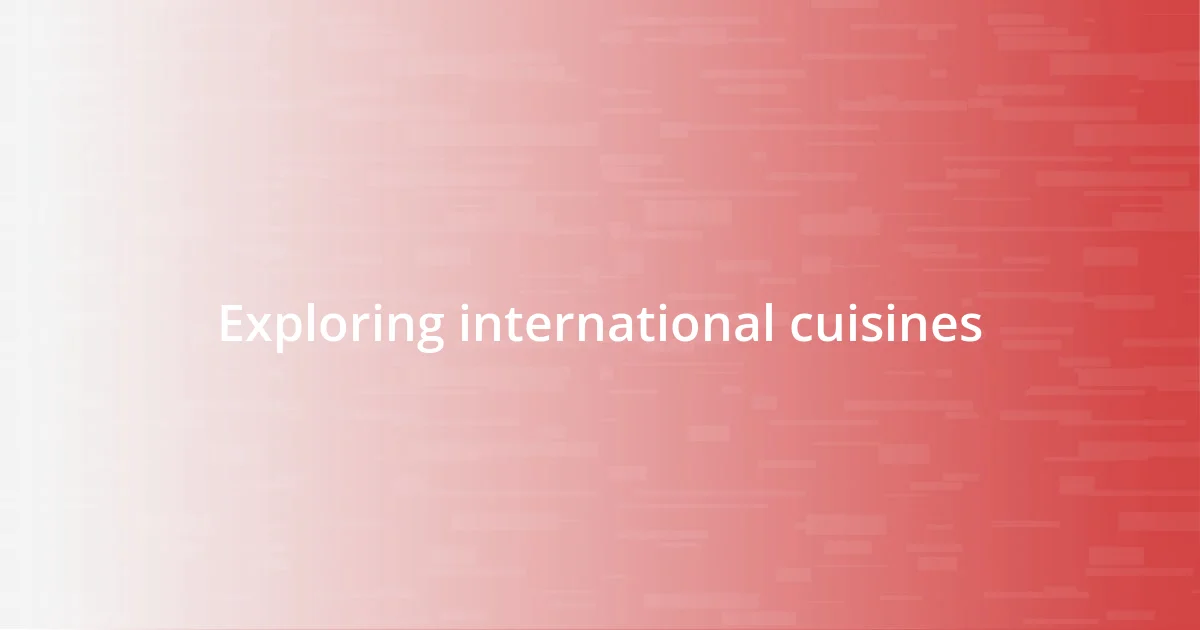
Exploring international cuisines
Exploring international cuisines has unlocked a world of flavors and techniques for me. I vividly remember my first experience with Thai cooking; the moment I whisked together coconut milk, fresh lime, and fragrant lemongrass, it felt like a burst of sunshine in my kitchen. Each ingredient brought a warmth and vibrancy that transported me to street food stalls in Bangkok. Have you ever tried cooking a dish that felt like a mini-vacation for your taste buds?
Delving into the culinary traditions of different cultures has been a delightful journey. One evening, I decided to tackle a classic Moroccan tagine, an aromatic stew of spices, meat, and vegetables. As I ground cumin, coriander, and cinnamon, the fragrance wrapped around me, creating a comforting ambiance that made me feel connected to the heart of Moroccan kitchens. What surprised me most was how the slow cooking process allowed the flavors to deepen, and I couldn’t help but think, isn’t it interesting how patience can bring out the best in a dish?
Sharing these international culinary adventures with friends has taken my experiences to another level. Whenever I host a themed dinner night, it’s like inviting everyone on a little global getaway. I recall a pasta night featuring homemade gnocchi from Italy, where each bite was a testament to the love and care that went into the preparation. The laughter and stories exchanged over plates of food not only made for a memorable evening but also highlighted the universal language of cooking—connecting people from various walks of life through the joy of shared flavors. Isn’t it remarkable how food can create bonds that transcend cultural boundaries?










